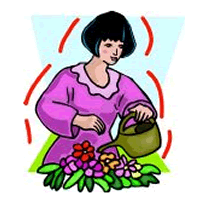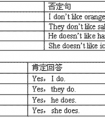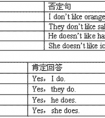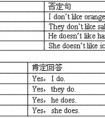根据所给图片,补充句子。1. Thesignsays, " ."2. Mysister everyday.3. Heverymuch.4. LiMing yesterdayevening.5. Theyarein . -六年级英语
题文
| 根据所给图片,补充句子。 |
1. The sign says, " ."  |
2. My sister every day.  |
3. He very much.  |
4. Li Ming yesterday evening.  |
5. They are in .  |
答案
| 1. No parking / Don't park here 2. makes the bed / does (the) housework 3. likes (loves, enjoys) painting 4. watered the flowers 5. going to (visit / fly to) the Summer Palace and the Great Wall, China (Beijing) |
据专家权威分析,试题“根据所给图片,补充句子。1. Thesignsays, " ."2. Mysister..”主要考查你对 祈使句,复数名词,名词,一般现在时,动词单数第三人称,一般过去时,动词过去式,一般将来时 等考点的理解。关于这些考点的“档案”如下:
祈使句复数名词名词一般现在时,动词单数第三人称一般过去时,动词过去式一般将来时
考点名称:祈使句
祈使句:
表达说话人对对方的叮嘱、劝告、希望、禁止、请求或命令等。
祈使句一般以动词原形开头,无时态和数的变化,句末用句号或感叹号,用降调。
祈使句的肯定结构是:
动词原形+其他;
否定结构是:
Don't+动词+其他。
另外,Let's也能引导祈使句, 其后接动词原形。
例:Please open the door. 请打开门。
Don't be late next time. 下次别迟到。
Don't run on the train. 不要在火车上跑。
Let's go to school. 让我们去上学。祈使句含义:
1. 表请求
Pass me the sugar, please. 请把糖递给我。
2. 表命令
Put up your hands. 举手。
Fill in this form. 把这个表填好。
3. 表建议
Let’s have dinner together. 我们共进晚餐吧。
4. 表邀请
Come in and have a seat. 进来请坐。
Help yourself to some fruits. 请吃水果。
5. 表警告
Hurry up or you will be late.抓紧点,不然你要迟到了。
Do that again and you”ll be in trouble.要是再干那事,你会有麻烦的。
6. 表禁止
Don’t touch the exhibits.不要触摸展品。
Don’t play on the road.不要在马路上玩耍。
7. 表叮嘱
Be sure to get there before nine. 务必在九点前赶到那里。
Take care not to catch cold. 小心别着凉了。
8. 表号召
Workers of all countries, unite! 全世界工人阶级联合起来!
9. 表祝愿
Have a good trip. 祝你旅途愉快。
祈使句一般特点:
1.谓语大都是表示行为动作的动词或动词性词语,表示的动作是未然的。
2.主语一般是第二人称代词“你、你们”,往往省去。也有时用第一人称“咱们”作主语。- 祈使句用法口令:
祈使句无主语,主语you常省去;
动词原形谓语当,句首加don't否定变;
朗读应当用降调,句末常标感叹号。
考点名称:复数名词
- 复数名词:
指名词的数量大于“一”,如:two books, some students
名词变复数:
1、一般情况下,词尾加s。如:students,apples,bags,trees,books,brothers
2、s,x,z,sh,ch等结尾的名词,词尾加es。如:glasses,boxes,brushes,matches
3、y结尾的名词分两种情况,“辅音字母+y”结尾的名词,将y变为ies;
“元音字母+y”结尾的名词,直接在词尾加s。
以辅音字母加y结尾的名词,变y为i加es:cities,babies,enemies。
以元音字母加y结尾的名词,如:boys
4、f或fe结尾的名词,一般将f或fe变为ves。如:leaf-leaves, wife-wives, knif-knives
5、规则名词:foot→feet,tooth→teeth, child→children,man→men, woman→women,
sheep→sheep,deer→deer, mouse→mice. - 名词变复数规则:



![Let's ____________ somefun.[ ]A.haveB.hasC.had-五年级英语](http://www.00-edu.com/d/file/ks/4/1/67/2019-09-01/smallee0c5b0456fd527ff36ce160b4dfe7ad1567348511.gif)

![Whatdoesthesignmean?(这标志是什么意思) [ ]A.Turnright!B.Don'tturnrightC.Turnleft!-六年级英语](http://www.00-edu.com/d/file/ks/4/1/67/2019-09-01/small641a4bfa9c93e8269087b9baa4d8d4411567348144.gif)
